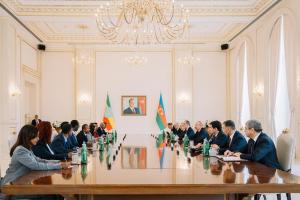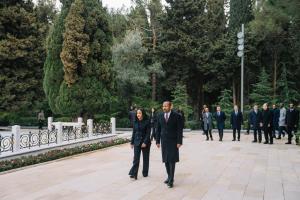Politics - ENA English
Politics
February 2026 Marks Defining Economic, Political Milestone as Ethiopia Accelerates National Transformation
Mar 3, 2026 663
Addis Ababa, March 3, 2026 (ENA) –February 2026 was defined by economic and political milestone in which pioneer digital services, extensive infrastructure and ecotourism development were launched along with strengthened strategic global partnerships, according to Office the Prime Minister. 𝐏𝐚𝐫𝐥𝐢𝐚𝐦𝐞𝐧𝐭𝐚𝐫𝐲 𝐀𝐝𝐝𝐫𝐞𝐬𝐬: 𝐄𝐜𝐨𝐧𝐨𝐦𝐢𝐜 𝐚𝐧𝐝 𝐏𝐨𝐥𝐢𝐭𝐢𝐜𝐚𝐥 𝐒𝐭𝐫𝐚𝐭𝐞𝐠𝐢𝐜 𝐃𝐢𝐫𝐞𝐜𝐭𝐢𝐨𝐧𝐬 During the 10th Regular Session of the House of Peoples’ Representatives, Prime Minister Abiy Ahmed highlighted Ethiopia’s successful shift toward a diversified, multi-sectoral economy, projecting a 10.2% GDP growth rate by year-end. He reported significant progress in fiscal discipline, noting that the government has not entered into any new commercial loan agreements in US dollars since the reform began, effectively easing the national debt burden. The Prime Minister shared record-breaking six-month results, including 5.1 billion USD from merchandise exports (120% of the plan), 4.5 billion USD from service exports, and 4.6 billion USD in remittances. He further underscored Ethiopia's technological leap, citing the establishment of Africa's first AI Institute and the world's second AI University, alongside a surge in connectivity with 97 million mobile users and 58 million mobile money users. Addressing national peace, he emphasized resolving differences through dialogue, the rights of Wolkait residents to live in peace, and the importance of the Tigray people becoming leading actors in the political arena. 𝐈𝐧𝐟𝐫𝐚𝐬𝐭𝐫𝐮𝐜𝐭𝐮𝐫𝐞 𝐚𝐧𝐝 𝐔𝐫𝐛𝐚𝐧 𝐓𝐫𝐚𝐧𝐬𝐟𝐨𝐫𝐦𝐚𝐭𝐢𝐨𝐧 Prime Minister Abiy Ahmed continued to drive national modernization through massive infrastructure reviews and launches. He personally observed the second phase of corridor development in Hawassa and reviewed the Nekemte corridor project, which features smart traffic management and underground utility systems. 𝐀𝐠𝐫𝐢𝐜𝐮𝐥𝐭𝐮𝐫𝐞, 𝐈𝐫𝐫𝐢𝐠𝐚𝐭𝐢𝐨𝐧, 𝐚𝐧𝐝 𝐅𝐨𝐨𝐝 𝐒𝐨𝐯𝐞𝐫𝐞𝐢𝐠𝐧𝐭𝐲 To reinforce food security, Prime Minister Abiy Ahmed conducted extensive field visits to major agricultural sites. He visited a banana cluster farm in Hawa Gelan Woreda under the "Bounty of the Basket" initiative and inspected the Qeto Irrigation Infrastructure Development Project, which ensures reliable water access for various crops. The Prime Minister also reviewed the nearing completion of the Arjo Didessa Irrigation Project and visited fruit development sites along the Bilate River involving private investors. Additionally, he launched the construction of the Busa Gonofa Integrated Food Industry, a modern facility designed to process 2,000 tons of maize daily. 𝐓𝐞𝐜𝐡𝐧𝐨𝐥𝐨𝐠𝐲, 𝐈𝐧𝐝𝐮𝐬𝐭𝐫𝐢𝐚𝐥𝐢𝐬𝐚𝐭𝐢𝐨𝐧, 𝐚𝐧𝐝 𝐌𝐢𝐧𝐢𝐧𝐠 Under the Digital Ethiopia 2030 strategy, Prime Minister Abiy Ahmed launched the nation’s first unmanned "smart" police service to enhance law enforcement through technology. In the industrial sector, he reviewed the Arjo Coal Processing Factory, which addresses domestic demand and supports the #MadeInEthiopia movement in increasing industrial capacity to 66.3%. The Prime Minister also visited the Tulu Kapi Gold Development Project in West Wollega, a public-private partnership aimed at harnessing natural resources for national economic growth and local community upliftment. 𝐄𝐜𝐨𝐭𝐨𝐮𝐫𝐢𝐬𝐦 𝐚𝐧𝐝 𝐒𝐮𝐬𝐭𝐚𝐢𝐧𝐚𝐛𝐥𝐞 𝐃𝐞𝐯𝐞𝐥𝐨𝐩𝐦𝐞𝐧𝐭 Expanding the "Dine for Generations" portfolio, Prime Minister Abiy Ahmed officially inaugurated the world-class Logo Hayk Resort in Wollo, designed to stimulate local economic transformation and showcase Ethiopia’s heritage. He also inspected the rapid progress of the Sorga Eco Lodge near Nekemte, a 14-hectare project focused on environmental conservation and sustainable tourism. Furthermore, the Prime Minister visited the Rural Corridors Program in Mede Jalela, where modern solar power and biogas systems are improving rural living standards. 𝐈𝐧𝐭𝐞𝐫𝐧𝐚𝐭𝐢𝐨𝐧𝐚𝐥 𝐄𝐧𝐠𝐚𝐠𝐞𝐦𝐞𝐧𝐭𝐬 On the diplomatic front, Prime Minister Abiy Ahmed hosted high-level visits from Italian Prime Minister Giorgia Meloni during the 2nd Italy-Africa Summit, Turkish President Recep Tayyip Erdoğan, and Israeli President Isaac Herzog to discuss on range of issues including but not limited to trade, investment, and regional issues. During an official visit to Azerbaijan, the Prime Minister met with President Ilham Aliyev to sign a Defense Cooperation Agreement and several MOUs covering Digital Transformation, investment, and anti-corruption. He also participated in multiple bilateral meetings with African Heads of State and Government during the 39th AU Summit. 𝐍𝐚𝐭𝐢𝐨𝐧𝐚𝐥 𝐒𝐞𝐜𝐮𝐫𝐢𝐭𝐲 𝐚𝐧𝐝 𝐈𝐧𝐬𝐭𝐢𝐭𝐮𝐭𝐢𝐨𝐧𝐚𝐥 𝐑𝐞𝐟𝐨𝐫𝐦 The Prime Minister attended the 65th-anniversary celebration of the Defense Forces Special Operations Command, where he observed modern airborne and water-borne tactical demonstrations. He commended the command’s reorganization into a modern structure capable of addressing contemporary security challenges. Additionally, the Prime Minister presided over Prosperity Party council meetings to deliberate on strategic priorities and reaffirmed the government's efforts to ensure the upcoming election is peaceful and fair.
Diplomats Affirm Ethiopia’s Sea Access Quest Legitimate Economic Priority
Mar 2, 2026 1899
Addis Ababa, March 2, 2026 (ENA) – Diplomats from Norway and Bangladesh have emphasized that Ethiopia’s pursuit of sea access is a legitimate and essential step toward the nation's economic progress. Speaking exclusively to the ENA, the envoys highlighted the importance of cooperation and shared prosperity. Their remarks align with Prime Minister Abiy Ahmed’s stance that the pursuit of maritime access must follow a lawful, peaceful, and mutually beneficial path. The ambassadors noted that their respective countries understand the strategic necessity of maritime access for a nation of Ethiopia’s scale. Norway’s Ambassador, Stian Christensen, acknowledged Ethiopia’s significant demographic weight and its expanding economy. “This is a national priority. We certainly recognize the importance of sea access for such a large country,” the Ambassador noted. He expressed his confidence that Ethiopia would find sustainable solutions, stating, “I'm confident that Ethiopia will find its way... through Djibouti and potentially through other avenues of accessing the sea.” Bangladesh’s Ambassador, Air Vice Marshal Sitwat Nayeem, on his part underlined the critical link between maritime access and global commerce. “Access to the sea is vital for any landlocked country because it is the most efficient gateway for trade and investment,” he said. “In this perspective, it is a legitimate demand for Ethiopia. This must be solved through mutual agreement and a win-win approach.” It was previously reported that Prime Minister Abiy Ahmed in address to the House of People's Representatives on February 3, 2026 clarified that Ethiopia and the Red Sea are "inseparable entities." He reiterated that Ethiopia's regional ambitions are not rooted in militarism, but in a desire for equitable growth and long-term stability in the Horn of Africa.
Adwa Victory Marked as Day That “Broke the Dark Sky Over Africa,” Says Prime Minister Abiy
Mar 2, 2026 1247
Addis Ababa, March 2, 2026 (ENA)—Prime Minister Abiy Ahmed has described the Victory of Adwa as the day “the sun broke through a sky that had been dark for all of Africa and Black people,” underscoring its historic and symbolic significance. In a message shared on his social media channels to mark the 130th anniversary of the historic triumph, the Prime Minister said the day represents Ethiopia’s decisive stand against foreign aggression. “It is the day Ethiopia triumphed over invading forces who had encroached upon her borders and violated her sovereignty and her people’s freedom on the mountains of Adwa,” he stated. The Victory of Adwa, secured on March 1, 1896, saw Ethiopian forces defeat the invading Italian army, safeguarding the nation’s independence and delivering a powerful blow to colonial expansion in Africa. The triumph has since stood as a symbol of resistance, dignity, and Black pride across the continent and the wider diaspora. Prime Minister Abiy further emphasized that the victory preserved an ancient civilization. “It is the day Ethiopia safeguarded a civilization that had remained unviolated for three thousand years,” he noted. Paying tribute to the patriots who fought at Adwa, the Premier said Ethiopia’s forefathers and foremothers deserve the highest respect for their sacrifice. “Our forefathers and foremothers deserve our utmost respect, who through the sacrifice of their blood handed down to us an Ethiopia in which we live with pride, alongside a marvelous civilization, history, and great honor,” he stated. Calling on present-day Ethiopians to honor that legacy, the Prime Minister urged unity and collective national effort. “We, the Ethiopians of today, must sustain the country our ancestors died to build by living in unity and love. Learning from them, we must say ‘No’ to poverty, division, and backward thinking, and transition Ethiopia toward prosperity,” he said. The Prime Minister also expressed optimism about the country’s future, voicing hope that the time when Ethiopia becomes even greater than ever before is not far off.
Adwa Triumph Stands as Timeless Beacon of Strength and Unity: ENDF Chief of Staff
Mar 2, 2026 1174
Addis Ababa, March 2, 2026 (ENA) —Ethiopian National Defense Force (ENDF) Chief of Staff, Field Marshal Berhanu Jula, described the Battle of Adwa as an enduring source of moral strength and resilience that continues to inspire generations. The 130th anniversary of the Victory of Adwa is being commemorated today under the theme ‘Glorious Past, Radiant Horizon,’ marking a monumental chapter in both Ethiopian and African history. The Victory of Adwa remains a defining chapter in Ethiopian and African history. On March 1, 1896, Ethiopian forces under Emperor Menelik II decisively defeated the Italian army at the Battle of Adwa. The triumph safeguarded Ethiopia’s sovereignty and sent a resounding message of resistance against colonialism across the African continent. Since then, it has stood as a symbol of national pride, courage, and the unyielding spirit of independence, inspiring generations both within Ethiopia and across the African diaspora. Speaking at the Adwa Memorial Museum, Field Marshal Berhanu emphasized the historical significance of the battle, highlighting the role of unity and bravery in overcoming colonial forces and protecting Ethiopia’s sovereignty. “The Victory of Adwa is a profound story of struggle, reflecting the broader fight of black peoples against oppression,” he said. He further added that this powerful day shattered the notion that black people are incapable of shaping history. He recalled the extraordinary clash on the battlefield, where Ethiopian warriors, equipped largely with traditional weapons, confronted an enemy armed with advanced artillery. “The resilience and determination of Ethiopian fighters became their most formidable weapon, illustrating the timeless value of courage in defending freedom,” he said. Reflecting on the colonial response, the chief of staff noted that Italian forces, unwilling to accept defeat, returned forty years later with modern warfare, including aerial bombardment. Despite these challenges, Ethiopian veterans adapted through guerrilla tactics, ultimately concluding the second colonial war and reinforcing Ethiopia’s independence. Highlighting the contemporary relevance of Adwa’s legacy, Field Marshal Berhanu said it continues to inspire the ENDF, guiding their commitment to safeguarding national interests and heritage. He also called for unity and solidarity as essential for advancing national ambitions, including projects like the Grand Ethiopian Renaissance Dam (GERD) and efforts to secure access to a sea outlet. He cautioned against actions that could undermine Ethiopia’s national interests, urging vigilance to protect the country’s agenda from external influences. “The memory of Adwa victory serves as a guiding light,” he concluded, “ensuring that the spirit of resilience continues to thrive across generations.”
Adwa Inspires Unity and Purpose for Ethiopia’s Prosperity, Says Mayor Adanech
Mar 2, 2026 1212
Addis Ababa, March 2, 2026 (ENA) —Addis Ababa Mayor Adanech Abiebie has urged Ethiopians to move beyond commemorating ancestral valor, calling on the current generation to embrace a renewed urgency in building a legacy of modern-day achievements. The Victory of Adwa, commemorated this year in its 130th anniversary, stands as a monumental chapter in both Ethiopian and African history. On March 1, 1896, Ethiopian forces under Emperor Menelik II delivered a decisive victory against the Italian army at the Battle of Adwa, a triumph that not only safeguarded Ethiopia’s sovereignty but also sent a powerful message of resistance against colonialism on the African continent. This victory has since been celebrated as a symbol of national pride, resilience, and the enduring spirit of independence that continues to inspire generations across Ethiopia and the wider African diaspora. Speaking at the occasion, held under the theme “Glorious Past, Radiant Horizon,” Mayor Adanech described the historic triumph as a beacon of independence and a monumental symbol of unity for all Black people and Africans. Reflecting on the occasion, she emphasized that the celebration is a solemn vow to transform the bravery of the past into tangible prosperity for Ethiopia’s future. "Today's Victory of Adwa is a grand history of heroism that serves as a pride for Black people, a lantern of freedom for Africans, and a symbol of unity and liberty," she said. "As we celebrate under the theme 'Glorious Past, Radiant Horizon,' we do so by learning from the heroism of the past and pledging ourselves to the future prosperity of our country." Mayor Adanech highlighted that the enduring lesson of Adwa is the necessity of standing together. Despite internal differences, she stressed that Ethiopians must remain united in defending national sovereignty and the dignity of citizenship. "The greatest thing Adwa taught us is that even if we have differences in our internal affairs, we must stand together without being divided when it comes to national sovereignty and the honor of our citizenship," she noted. She reminded the audience that the heroes of Adwa set aside differences to cement Ethiopia’s inviolable status through their sacrifices, urging the youth to resolve disagreements through dialogue and embrace their historic duty to protect national interests. Redefining heroism for the modern era, Mayor Adanech asserted that patriotism today extends beyond the battlefield. "Heroism is not only about defeating an invader on the battlefield; today, heroism includes bravely overcoming poverty, backwardness, and division," she explained. Just as the patriots of old defended the land, she said, the current generation must secure sovereignty through knowledge and labor. She cited initiatives like the Grand Ethiopian Renaissance Dam, the Wheat Initiative, the Green Legacy Initiative, and the Corridor Development as “Adwa victories of the new age.” Further emphasizing Ethiopia’s progress, Mayor Adanech highlighted strategic efforts to address historical injustices, including securing maritime access, as essential to building a multi-layered legacy. Describing Adwa as a “great school of patriotism,” she insisted that Ethiopia’s visible achievements today demonstrate that monumental goals can be attained through dedicated effort. "Beyond merely remembering the history of our former patriots, let us rise with a sense of urgency to create great and overlapping histories in our own time," she urged. Mayor Adanech concluded by affirming that Ethiopia will continue to live in honor and dignity through the continued dedication and sacrifice of its people.
Victory of Adwa Signifies Power of Unity for Remarkable Achievements, Says Outgoing Portuguese Ambassador
Mar 2, 2026 1213
Addis Ababa, March 2, 2026 (ENA) —The victory of Adwa is a testament that signifies the power of unity for achieving extraordinary results, Outgoing Portuguese Ambassador Luísa Fragoso told ENA. In an exclusive interview with ENA, Portugal's Ambassador Luísa Fragoso noted that the historic victory is a symbol of national pride and unity. She hailed the victory as a pivotal achievement which serves as a tribute to the significance of unity in achieving extraordinary goals. Portuguese celebrate this milestone alongside Ethiopians, Ambassador Fragoso stated, acknowledging the significance of the commemorative ceremonies. "We stand with you as you continue to reflect on this historic moment and strive to elevate your country to new heights," the Ambassador said. According to her, Adwa Victory stands as a major achievement for Ethiopia. "We (therefore) celebrate it continuously with you…We want to be at your side as you continue to reflect on these steps to build up your country to further heights." Emphasizing the importance of national unity, Ambassador Fragoso noted that the Adwa Victory is a testament to what a united nation can achieve when determined to pursue essential goals. Such moments call for collective action, she underlined, stressing that amicable results emerge from unity, allowing Ethiopia to stand proudly as the enduring nation it is. It certainly stands as an achievement of a nation that comes together and with a resolve to achieve something that it determines to be essential, the Ambassador underscored. "Whenever these moments come, it's a moment of call for action. And you then get your results when you are united and you stand as old-standing nation that you are." The 1896 Victory of Adwa was a watershed moment where Ethiopians decisively defeated the invading Italian army, marking the only successful African resistance against European colonization. It secured Ethiopia's sovereignty, inspired global anti-colonialism, and became a powerful symbol of Pan-Africanism and Black solidarity.
Minister Aisha Calls Adwa Victory an Eternal Inspiration for Defense Forces, African Unity
Mar 2, 2026 1102
Addis Ababa, March 2, 2026 (ENA) —The 130th Anniversary of the Victory of Adwa was marked with a vibrant celebration at the Adwa Victory Memorial, where Minister of Defense Aisha Mohammed hailed the historic triumph as an enduring source of inspiration for Ethiopia’s defense forces and a symbol of African unity. Speaking under the theme “Glorious Past, Radiant Horizon,” Minister Aisha described the victory as a beacon of freedom for all Black people and a lasting affirmation of human dignity. She emphasized that Adwa is not only a milestone in Ethiopian history but a global emblem of resistance and a testament to the sacrifices made for liberty and honor. Aisha further noted that the victory proved to the world the moral superiority of a united people, demonstrating that even the most modern and well-armed colonial aggressor is not invincible. The minister highlighted that the sacrifices made by our ancestors on the rugged mountains of Adwa restored African dignity and laid the groundwork for the continental unity and collective security cooperation witnessed today. The presence of African Defense Ministers at the anniversary celebrations, she remarked, serves as a powerful confirmation that Adwa is a shared heritage of freedom for the entire continent and the world at large. The Minister further asserted that today's Ethiopian National Defense Force is the living embodiment of this heroic lineage. Beyond safeguarding national sovereignty, she noted that the military continues to serve as a vanguard for peace and stability across Africa, paying irreplaceable sacrifices in the line of duty. "Adwa lives on within the discipline and indomitable spirit of our forces; it is the eternal sustenance of our bravery," Aisha stated. Reflecting on this year's theme, the Minister reminded the current generation of their duty to translate the inherited legacy of freedom into comprehensive national sovereignty and prosperity. She urged that the psychological strength drawn from the peaks of Adwa must now be channeled into achieving national greatness through hard work and dedication. Aisha concluded by affirming that the Covenant of Adwa for this era is to pass down this historic responsibility as a source of pride and tangible achievement for the generations to come.
From the Mountains of Adwa to Guba, Honouring Adwa in Its Full Glory
Mar 2, 2026 1116
Addis Ababa, March 2, 2026 (ENA) —From the historic mountains of the Battle of Adwa to the rising horizons of Guba, the site of the Grand Ethiopian Renaissance Dam (GERD), Ethiopia continues to celebrate Adwa in its fullest meaning and enduring glory. The Victory of Adwa was not merely a triumph on the battlefield; it was a powerful declaration to the world that Ethiopia would determine its own destiny, according to the Office of the Prime Minister of Ethiopia. At a time when much of Africa had fallen under colonial rule, Adwa stood as a bold affirmation of sovereignty, dignity, and national unity, a defining moment that reshaped perceptions of Africa’s strength and resolve. “We honor their sacrifice not by living in yesterday’s glory, but by building today’s legacy,” the Office stated. “Guided by the Spirit of Adwa, we continue to shape our nation’s future.” By linking the courage of Adwa with Ethiopia’s present-day development ambitions, the statement underscores a national vision rooted in unity, resilience, and forward-looking determination from the mountains of Adwa to the transformative projects rising along the Abbay.
AUC Chairperson Pays Tribute to Historic Victory of Adwa
Mar 2, 2026 1484
Addis Ababa, March 2, 2026 (ENA) — On the occasion of Adwa Victory Day, Mahmoud Ali Youssouf, Chairperson of the African Union Commission, paid solemn tribute to Ethiopia’s heroic triumph at the Battle of Adwa. Ethiopian forces fought with extraordinary courage on 2 March 1896 at the Battle of Adwa — a defining milestone in Africa’s struggle for freedom, dignity, and self-determination. “Adwa stands as an enduring symbol of African sovereignty, courage, resilience, and unity,” the Chairperson declared. According to him, “At a time when much of the continent had fallen under colonial domination, Adwa sent an unmistakable message to the world: Africa would not submit to foreign rule. Africa would determine its own destiny.” He emphasized that the legacy of Adwa continues to resonate across generations and remains a cornerstone of the continent’s transformation vision, particularly within the framework of Agenda 2063. “As we confront today’s complex global and continental challenges from securing peace to accelerating economic transformation, the spirit of Adwa calls upon us to stand united. Africa’s greatest strength lies in its solidarity, collective resolve, and shared purpose,” he underscored. The African Union Commission reaffirmed its unwavering commitment to advancing peace and security, deepening continental integration, and promoting inclusive growth and shared prosperity for all Africans. In 1896, Ethiopian forces led by Emperor Menelik II achieved a decisive victory over the invading army of the Kingdom of Italy at Adwa, preserving Ethiopia’s independence at a pivotal moment in history. The triumph shattered prevailing assumptions of European military invincibility and inspired movements of resistance and liberation across Africa and the diaspora. More than a military victory, Adwa became a powerful emblem of African pride and Pan-African solidarity; a historic achievement that continues to inspire the continent’s march toward unity, justice, sovereignty, and sustainable development.
Adwa Victory Reflects Ethiopia’s Unyielding Resolve, Says Prime Minister Abiy
Mar 1, 2026 1705
Addis Ababa, March 1, 2026 (ENA) — Prime Minister Abiy Ahmed has described the Victory of Adwa as a defining testament to the unbreakable determination and enduring strength of the Ethiopian people. In a message marking the 130th anniversary of the historic triumph at the Battle of Adwa, the Prime Minister called on citizens to reflect on what he characterized as a pivotal chapter in Ethiopia’s history, a moment when the nation affirmed its resolve to defend freedom and independence at any cost. According to PM Abiy, the victory stands as enduring proof that Ethiopians rise firmly in defense of their national interests and sovereignty. He noted that through collective commitment and unwavering resolve, the people have consistently demonstrated their readiness to mobilize all available resources to safeguard their country and secure its future on a strong foundation. The Prime Minister underscored that while systems and leaders may change and differences may arise on various issues, the shared commitment to defend the nation remains constant. Reflecting on the patriots who marched to Adwa, he emphasized that unity did not require uniformity. “They were united by a common purpose, but they were not identical. They shared one nation, yet they came from different cultures and professed different faiths,” he stated. At that critical moment in history, he recalled, there were also individuals who sided with the enemy, including mercenaries and brokers who placed short-term gains above the long-term interests of their homeland. “Our heroic mothers and fathers fought not only against the invading army of Italy, but also stood firm against collaborators, bandits, and agents who worked against the interests of their own country. Patriotism meant confronting betrayal in all its forms,” the Prime Minister said. He added that genuine patriotism required placing the nation above personal benefit and sacrificing individual comfort to preserve the country’s honor. Commemorating Adwa Victory Day, Abiy said the occasion calls for remembrance of the sacrifices made and stands as a testament to the courage, unity, and resolve that defined a generation and revealed Ethiopia’s determination to the world. Today, he stressed, that same conviction must be reflected in national development efforts. Strength, he noted, must be visible across agriculture, industry, tourism, mining, and the digital sector. Ethiopia’s power, he said, must rest on a firm and lasting foundation capable of carrying the spirit of Adwa into every sphere of national life. Only then, he added, can the victory of yesterday be transformed into sustainable progress for tomorrow. The Prime Minister further emphasized that such comprehensive strength expands national capacity, deepens resilience, reinforces Ethiopia’s global standing, and elevates its voice on the international stage.
Adwa Victory Inspired Africa’s Struggle for Freedom, Says UNESCO Peace Center Chief
Mar 1, 2026 1743
Addis Ababa, March 1, 2026 (ENA)— The Victory of Adwa stands as a historic milestone that not only secured Ethiopia’s sovereignty but ignited hope across Africa, the head of the UNESCO Peace Center has said. Guy Djoken, Executive Director of the UNESCO Center for Peace and Chairman of the U.S. National Commission for UNESCO Clubs, Centers and Associations Working Group, said the triumph resonates far beyond Ethiopia’s borders. Speaking to ENA on the 130th anniversary of the historic battle, he described Adwa as a shared legacy for people of African descent worldwide and a defining symbol of unity and sovereignty. In 1896, Ethiopian forces led by Emperor Menelik II defeated the invading army of the Kingdom of Italy at the Battle of Adwa, preserving the nation’s independence at a time when much of Africa had fallen under colonial rule. The victory overturned the prevailing belief in European military supremacy and marked a watershed moment in African history. “The Victory of Adwa is a victory of the entire black people,” Djoken said. “Ethiopians united in spirit to defend the sovereignty of their country, and in doing so, they brought hope to Africans everywhere.” Reflecting on Ethiopia’s singular place in the era known as the Scramble for Africa, Djoken noted that the country remains the only African nation to have decisively defeated a colonial power during that period. “Not a single African participated in the Berlin Conference,” he said, referring to the 1884 to 1885 meeting where European powers partitioned the continent. “When they came to take their share, I am very proud that Ethiopia was able to defeat the fascist Italian government. For me, this victory is a sign of hope.” Djoken also linked Ethiopia’s historic stand at Adwa to the decision to establish the headquarters of the African Union in Addis Ababa. “The founding of the African Union in Addis Ababa was not a coincidence,” he said. “It was the result of Ethiopia’s historical legacy and its contribution to the idea of Pan Africanism.” Beyond its historic military success, he emphasized Ethiopia’s continued role in promoting continental cooperation and development. “Africa has natural resources and a lot of human resources. This is the time of Africa’s resurrection,” Djoken said. “We must make the young generation know that the African continent wants all its children. It is a continent with a lot of resources that can also determine the future of the world.” He stressed that global powers are increasingly turning their attention to Africa because of its strategic importance and potential. “The future of the world is here. All these major powers are trying to have a place in Africa. But we, children of Africa, sometimes we do not realize that. If they all want to come here, it is because the future of the world is here,” he said. Describing Ethiopia as a beacon of renewal, Djoken said the country continues to embody the spirit of Adwa more than a century later. “Ethiopians deserve the title of symbol of African development because they are truly the role models of Africa,” he said. “For me, Ethiopia is one of the symbols of renewed hope for Africa.”
International Community Urges for Urgent Talks on Middle East Crisis
Mar 1, 2026 1511
Addis Ababa, March 1, 2026 (ENA)— A coordinated military operation involving Israel and the United States was launched against Iran on Saturday, drawing reactions from officials and governments around the world,” according to multiple international reports. U.S. President Donald Trump had previously warned that Washington would take action to degrade Iran’s missile capabilities and prevent the country from developing a nuclear weapon, framing the campaign as a response to what he described as longstanding threats posed by Tehran’s military programs. In that regard, global leaders have issued a desperate call for an immediate return to negotiations and a cessation of hostilities after a massive, coordinated military strike by the United States and Israel decapitated Iran’s top leadership, triggering a violent wave of retaliatory attacks across the Middle East. Iranian state television confirmed early Sunday morning that Ayatollah Ali Khamenei, the Supreme Leader of the Islamic Republic since 1989, was killed in his compound during the initial wave of strikes on Saturday, February 28, 2026. The violence quickly spread beyond Iran and Israel that incidents were reported in Dubai, Doha and Kuwait. The United Nations (UN) and the African Union (AU) expressed deep concern over the rapidly deteriorating situation. Addressing an emergency meeting of the Security Council, António Guterres warned that urgent action is required to prevent further escalation. “Everything must be done to prevent further escalation,” he said. “The alternative is a potential wider conflict with grave consequences for civilians and regional stability.” The Chairperson of the African Union Commission, Mahmoud Ali Youssouf, called for restraint and renewed diplomatic engagement. He stressed the need to uphold international law and the United Nations Charter in order to safeguard global peace and security. Youssouf cautioned that continued military confrontation could destabilize energy markets, disrupt food supplies and undermine economic resilience, particularly in Africa where many countries are already grappling with conflict and economic pressures. He urged all parties to prioritize diplomacy and support ongoing mediation efforts led by the Sultanate of Oman, emphasizing that sustainable peace can only be secured through dialogue rather than force. As tensions mount and regional capitals brace for further violence, the international community’s message has been clear: halt hostilities and return to the negotiating table before the crisis deepens into a broader and more devastating conflict.
PM Abiy’s Visit to Azerbaijan Catalyzes Long-term Strategic Cooperation: FM Gedion
Feb 28, 2026 1879
Addis Ababa, February 28, 2026 (ENA) – The recent official working visit of Prime Minister Abiy Ahmed and his high-level delegation to Azerbaijan marks a decisive step in cementing the enduring and multifaceted partnership between the two nations, according to the Minister of Foreign Affairs, Gedion Timotheos. In a detailed briefing following the diplomatic mission, the Foreign Minister highlighted that the bilateral relationship between Ethiopia and Azerbaijan has witnessed significant upward momentum and an expanding scope of cooperation over the past few years. Minister Gedion emphasized that the Prime Minister’s visit at the leadership level, complemented by the signing of several key agreements across diverse sectors, is instrumental in ensuring that the Ethio-Azerbaijan ties remain comprehensive and sustainable. He noted that the two countries have reached a mutual understanding to forge partnerships in several new and emerging fields. Acknowledging Azerbaijan’s successful hosting of the 29th United Nations Climate Change Conference (COP29), the Foreign Minister remarked on Baku’s profound expertise in organizing high-stakes international forums. He stated that Azerbaijan has demonstrated a strong commitment and enthusiasm to share this experience and collaborate closely with Ethiopia. Furthermore, Minister Gedion revealed that Azerbaijan views Ethiopia as a strategic gateway to the African continent. Baku has expressed a keen interest in utilizing Ethiopia’s unique geopolitical position to expand its investment footprint and trade reach across the region. Consequently, both nations have agreed to intensify their cooperation in trade and investment frameworks. The Foreign Minister also pointed out that Ethiopia stands to gain significant insights from Azerbaijan’s success in digitizing public services. Azerbaijan’s effective integration of technology into governance offers a valuable model for Ethiopia as it continues its own digital transformation journey. Describing the overall visit as highly productive, the Foreign Minister concluded that the mission has laid a solid foundation for future cooperation, creating a conducive environment for mutual growth and regional integration.
AU Calls for Restraint and Urgent De-escalation Amid US-Iran Conflict
Feb 28, 2026 1395
Addis Ababa, February 28, 2026 (ENA) – The African Union Commission has expressed grave concerns over the military strikes, marking a perilous escalation in hostilities in the Middle East. The Chairperson, Mahmoud Ali Youssouf, emphasized the urgent need for restraint and diplomatic engagement among all parties, highlighting the necessity of adhering to international law and the United Nations Charter to protect global peace and security. He cautioned that further military escalation poses a significant threat to international stability, with potential repercussions on energy markets, food security, and economic resilience — issues that are particularly pressing in Africa, where conflict and economic challenges are already widespread. The Chairperson called for prioritizing diplomatic solutions, advocating for sustained dialogue and ongoing international mediation efforts led by the Sultanate of Oman. Reiterating the importance of diplomacy, Youssouf asserted that lasting peace can only be achieved through dialogue, not military force.
Ethiopia, Azerbaijan Bolster Multi-Faceted Bilateral Cooperation
Feb 28, 2026 1718
Addis Ababa, February 28, 2026 (ENA) – The partnership between Ethiopia and Azerbaijan has seen remarkable growth over the past few years, evolving into a robust collaboration across several strategic sectors, according to Billene Seyoum ,Press Secretary for the Office of the Prime Minister. In a comprehensive briefing regarding the official working visit of Prime Minister Abiy Ahmed to Baku, Billene, highlighted the strengthening diplomatic and economic ties between the two nations. The Prime Minister and his delegation conducted the two-day visit following an invitation from President Ilham Aliyev. The Press Secretary noted that the relationship has gained significant momentum, marked by an active exchange of experiences and institutional knowledge. She pointed out that Azerbaijan’s decision to establish its embassy in Addis Ababa has been a pivotal factor in facilitating this deepened cooperation. Economic synergy remains a central pillar of the bilateral agenda, with both countries working to scale up engagement in aviation and diverse industrial fields. Specifically, Ethiopian Investment Holdings has been engaged in high-level consultations with its Azerbaijani counterpart to align investment interests and foster joint ventures. During the high-level talks, Prime Minister Abiy Ahmed and President Ilham Aliyev explored various avenues to solidify cooperation in energy, agriculture, industry, and defense. The discussions also touched upon security, climate change mitigation, and job creation, reflecting the elevated status of the partnership. The Prime Minister’s visit included tours of Azerbaijan’s major infrastructure projects, urban modernization initiatives, and technology-backed service delivery systems. These sites demonstrate Azerbaijan’s success in converting natural resources into sustainable economic value, offering a roadmap for similar developmental aspirations. The Press Secretary emphasized that the visit provided essential insights that will further inspire Ethiopia’s ongoing national projects. She noted the similarities between Azerbaijan’s achievements and Ethiopia’s current focus on Corridor Development, the preservation and renovation of heritage sites, and the implementation of efficient one Stop Service Center. The visit concludes with a reinforced commitment to translate these high-level discussions into practical economic benefits, ensuring the partnership continues to serve the mutual interests of both peoples.
Competing Political Parties Vow to Make 7th General Election Expression of People's Desires
Feb 28, 2026 1753
Addis Ababa, February 28, 2026 – Ethiopia's competing political parties have expressed their commitment to making the 7th General Election an election where the will of the people prevails and the desires of the people are reflected. According to the National Election Board of Ethiopia (NEBE), the 7th General Election will take place on June 1, 2026. NEBE is undertaking various preparations, and voter registration will start next weekend. Political parties have registered candidates and training of trainers for election officials is being given by the Board. Recently, the Board announced the election symbols of political parties participating in the 7th General Election; and the parties have also signed a code of conduct aimed at making the election fair, democratic, and credible. Political parties approached by ENA have affirmed their commitment to ensuring that the election is an expression of the will of the people. The Amhara Democratic Force Movement Chairman, Tesfahun Alemneh, stated that his party is actively engaging in the election. For Tesfahun, the party has been carrying out various activities to achieve better results and make sure that the election reflects the will of the people; and the final winners are the people. The election should be peaceful, democratic and credible, he stressed, adding that his party is ready to fulfill its responsibility in this regard. Furthermore, he said the party has prepared a program that enables it to compete in the general election, stressing that the party will work hard to make its mark on the development of the democratic system. Sidama Unity Party Chairman, Lemma Oyato, said that the party has registered its candidates, citing that the party members have been given capacity building training as the party is ready to play its part in ensuring that the election is held in a peaceful and democratic manner. Wollene People's Democratic Party Chairman, Feysel Abdilaziz, underscored the need to act in accordance with the rules of the Board and the country laws for the election to become a success. He said that the party has signed candidates code of conduct recently introduced by the Ethiopian National Election Board. According to him, competing political parties should fulfill their national responsibilities by following and implementing similar ethical principles.
Population, Leadership and Connectivity Position Ethiopia Prime Investment Hub: Institute
Feb 27, 2026 2028
Addis Ababa, February 27, 2026 (ENA) – Africa Leather and Leather Products Institute (ALLPI) has affirmed that Ethiopia’s strong leadership, vast domestic market and global air connectivity are positioning the country as one of Africa’s most attractive investment destinations. In an interview with ENA, ALLPI Executive Director Nicholas Mudungwe described Ethiopia’s strategic strengths, pointing to its population size, reform-oriented leadership and the global reach of Ethiopian Airlines as decisive advantages for investors seeking growth opportunities in the region. He noted that with an estimated population of about 130 million, Ethiopia offers a significant and expanding market base. "The first important factor when you look at Ethiopia is the population,” he said, adding that it is a big market already. Drawing comparisons with China and India, Mudungwe observed that demographic scale has played a central role in driving economic expansion in those countries, adding that Ethiopia’s population presents a similar opportunity for investment led growth. He also commended the country’s leadership for ongoing urban transformation efforts, particularly in Addis Ababa, which he said are enhancing the business environment. "The second is the leadership that we have in Ethiopia. We see even the city Addis Ababa is being transformed, which is attracting investors," he stated. According to him, investors prioritize efficient transport systems, reliable connectivity and a clean urban setting, all of which Ethiopia is working to strengthen. Mudungwe further underscored the contribution of Ethiopian Airlines in linking the country to Africa and the wider world, easing access for business travelers and investors. He emphasized that the Ethiopia airlines has connected the entire continent and the entire world with Ethiopia. According to him every investor wants transport, needs a clean city and the market, and Ethiopia has all those things. The executive director also emphasized the significance of the Made in Ethiopia movement in promoting locally manufactured products and demonstrating the country’s industrial potential. "Seeing is believing," he noted, explaining that showcasing tangible products helps convince both local and international buyers and investors of Ethiopia’s manufacturing capacity. Mudungwe reaffirmed ALLPI’s commitment to strengthening private sector capacity and supporting businesses to tap into continental opportunities. "We are here to work step by step with all stakeholders to succeed as Africa," he said.
PM Abiy Visits Azerbaijan’s Technological, Energy Milestones
Feb 27, 2026 1754
Addis Ababa, February 27, 2026 (ENA) – Prime Minister Abiy Ahmed along with his delegation visited Azerbaijan’s Innovation Center of the State Agency for Public Service and Social Innovations (ASAN), which showcased Baku’s strategic approach to scaling AI-driven governance and modernizing public services. The visit also included a tour of AI Academy, the nation's premier hub for AI engineering and leadership training, underscoring a shared commitment to digital excellence. According to a post on the social media of Office of the Prime Minister, the delegation further extended its tour to the Sangachal Terminal, one of the world's most expansive oil and gas processing hubs, and the Alat Free Economic Zone. These immersive experiences are poised to fortify the burgeoning partnership between Ethiopia and Azerbaijan, specifically within the realms of trade, energy, and comprehensive digital transformation. At the ASAN Innovation Center, Prime Minister Abiy observed firsthand how Azerbaijan has streamlined public services through integrated digital platforms. The visit to the AI Academy highlighted the importance of cultivating a highly skilled workforce to lead the next generation of technological advancement, a vision that resonates with Ethiopia’s own digital transformation journey. Besides, the visit to the Sangachal Terminal and the Alat Free Economic Zone provided the delegation with deep insights into Azerbaijan’s logistical and energy prowess. These sites represent the backbone of the region's economy, offering a blueprint for industrial efficiency and international trade connectivity that could inform future bilateral economic strategies. Earlier, Prime Minister Abiy held substantive talks with President Ilham Aliyev to chart a course for deeper bilateral relations. The Prime Minister’s official visit began on Thursday, accompanied by First Lady Zinash Tayachew and a senior ministerial delegation. Reflecting on the historical and emotional weight of the host nation, the Prime Minister participated in a wreath-laying ceremony at the Alley of Honor and the Victory Monument. He expressed profound respect for those who sacrificed their lives for Azerbaijan’s sovereignty, noting that such resilience serves as a testament to the unity of its people. Relations between Ethiopia and Azerbaijan have flourished in recent years, driven by forward-looking policies and an increasingly active presence on the global stage. As both nations continue to register rapid developmental gains, this visit is expected to usher in a more dynamic phase of cooperation, bridging the gap between East Africa and the Caucasus through innovation and strategic economic ties.
PM Abiy Hails Expanding Ethiopia–Azerbaijan Partnership Driven by Economic Cooperation
Feb 27, 2026 2368
Addis Ababa, February 27, 2026 (ENA) –Prime Minister Abiy Ahmed has praised the growing bilateral relationship between Ethiopia and Azerbaijan during his maiden official visit to the country. In a social media post, the Prime Minister expressed his sincere gratitude to President Ilham Aliyev for the warm reception accorded to him and his delegation. PM Abiy noted that relations between the two nations have expanded consistently in recent years, driven by growing collaboration in key economic sectors. “Over the past few years, our partnership has steadily expanded, underpinned by recent economic cooperation in the aviation sector, collaboration in industrial parks and free trade zones, and joint engagements between Ethiopian Investment Holdings and its Azerbaijani counterpart,” he stated. He emphasized that these initiatives have established a strong foundation for further strengthening bilateral ties. According to the Prime Minister, the two sides held in-depth discussions focused on consolidating and elevating cooperation across multiple areas of mutual interest. During the visit, the leaders also presided over the signing of an Agreement on Cooperation in the Field of Defense and witnessed the exchange of several memoranda of understanding (MoUs), signaling an expansion of collaboration beyond economic engagement into strategic and security spheres. The visit marks a significant step forward in advancing diplomatic, economic, and strategic relations between Ethiopia and Azerbaijan.
Prime Minister Abiy Confers with President Ilham Aliyev of Azerbaijan
Feb 27, 2026 1970
Addis Ababa, February 27, 2026 (ENA) –Prime Minister Abiy Ahmed held talks with President Ilham Aliyev during his official visit to Azerbaijan, aimed at further strengthening bilateral relations between the two countries. Ahead of the meeting, the Prime Minister participated in a wreath-laying ceremony at the Alley of Honor and the Victory Monument in Baku. The ceremony paid tribute to national heroes and symbolized the resilience and unity of the Azerbaijani people. Prime Minister Abiy expressed profound respect and honor for those who made the ultimate sacrifice in defense of Azerbaijan’s unity and sovereignty. Prime Minister Abiy began his official visit to Azerbaijan on Thursday as part of ongoing efforts to strengthen the growing partnership between the two nations. According to the Office of the Prime Minister, Premier Abiy, accompanied by First Lady Zinash Tayachew and a high-level delegation, arrived late in the day at Heydar Aliyev International Airport in the capital. The visit follows an official invitation from President Aliyev, which the Prime Minister accepted. During his stay, he is expected to hold high-level discussions focusing on the current state of bilateral relations and prospects for expanding cooperation across key sectors. Relations between Ethiopia and Azerbaijan have strengthened in recent years, marked by sustained diplomatic engagement and expanding areas of cooperation. Both countries have registered rapid development supported by forward-looking policies and an increasingly active international presence. Officials emphasized the importance of enhancing collaboration in political, economic, and strategic spheres. The visit is expected to further elevate bilateral ties and open new avenues for mutually beneficial cooperation, ushering in a more dynamic phase in Ethiopia–Azerbaijan relations.
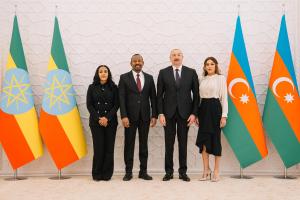
.jpg)
.jpg)
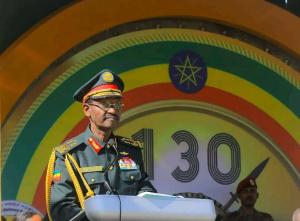
.jpg)
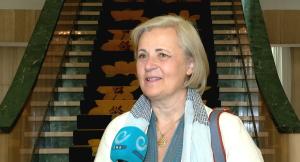
.jpg)

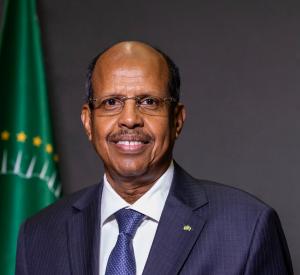
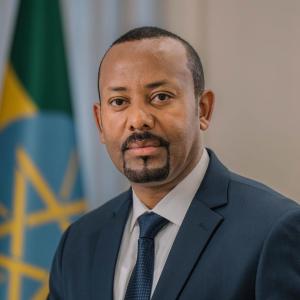

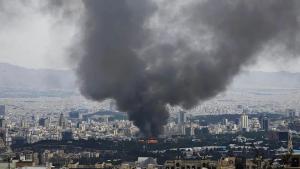
.jpg)
.jpg)
.jpg)
.jpg)
.jpg)

